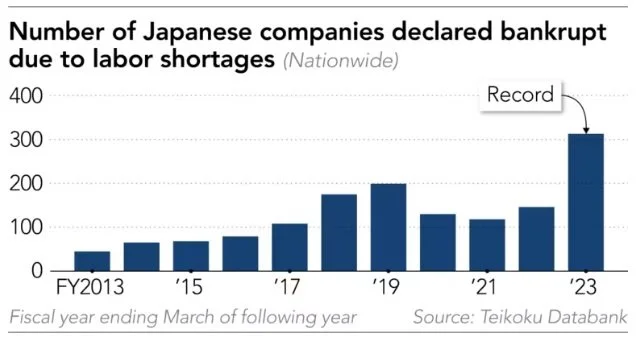Labor shortage in Japan and what that means for you Part 1: Corporate bankruptcies on the rise
Japan’s labor shortage isn’t just a long-term concern—it’s already having a serious impact. The Asahi Shimbun reported that in the first half of 2025, 172 companies went bankrupt specifically because they couldn’t find enough workers. That’s a 17.8% increase from last year and the highest number since records began in 2013. This means that the 2023 record will be broken again this year.
In total, it seems 4,990 companies went bankrupt between January and June 2025, the most in over a decade.
Rising costs and inflation are part of the problem, but for many small and medium-sized businesses, not being able to hire enough people is the final straw.
Who’s Struggling the Most?
Service industries like restaurants and hotels are hit hard.
Construction companies are facing both labor shortages and expensive materials.
Manufacturers are dealing with rising import costs and losing skilled workers.
Smaller companies are especially vulnerable—they can’t always match the salaries and benefits offered by big corporations, so they lose out in the competition for talent.
How Does This Compare Globally?
Labor shortages are a challenge in many countries, but Japan’s situation is more extreme. The population is aging fast, birth rates are low, and immigration is limited. In contrast, European countries often rely on immigration and labor mobility to fill gaps, and the U.S. has similar issues but fewer bankruptcies directly linked to labor shortages.
What does this mean for you?
If you are interested in working for a Japanese company abroad or in Japan itself, and especially if you speak some Japanese, this means you have a better position on the job market than ever before. If you want to prepare for such a job, why not get some additional training!
Want to know more? At Japan Consulting Office, we specialize in equipping professionals to thrive in cross-cultural environments. Whether you’re looking for group training or one-on-one sessions, we’ve got you covered!
If you want to learn more about bridging language and cultural gaps in Japanese business, why not join one of our sessions! Here’s the link to upcoming sessions (make sure to select your timezone

